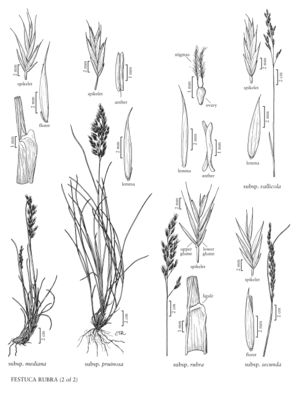Difference between revisions of "Festuca rubra subsp. rubra"
FNA>Volume Importer |
FNA>Volume Importer |
||
| Line 16: | Line 16: | ||
-->{{Treatment/Body | -->{{Treatment/Body | ||
| − | |discussion=<p | + | |discussion=<p>Festuca rubra subsp. rubra grows in disturbed soil. It is often planted as a soil binder, or as turf or forage grass, in mesic temperate parts of the Flora region. Originally from Eurasia, it has been widely introduced elsewhere in the world, including most of the Flora region, from southern Alaska east to Newfoundland and Greenland and south to California and Georgia. It also grows in Mexico. Because F. rubra subsp. rubra has often been misunderstood, confounded, and lumped with other taxa of the F. rubra complex, statements about its distribution, including that given here, should be treated with caution. It is to be expected throughout the Flora region, in all but the coldest and driest habitats.</p> |
|tables= | |tables= | ||
|references= | |references= | ||
| Line 32: | Line 32: | ||
|basionyms= | |basionyms= | ||
|family=Poaceae | |family=Poaceae | ||
| + | |illustrator=Cindy Roché | ||
|reference=None | |reference=None | ||
|publication title= | |publication title= | ||
|publication year= | |publication year= | ||
|special status= | |special status= | ||
| − | |source xml=https:// | + | |source xml=https://bibilujan@bitbucket.org/aafc-mbb/fna-data-curation.git/src/314eb390f968962f596ae85f506b4b3db8683b1b/coarse_grained_fna_xml/V24/V24_590.xml |
|subfamily=Poaceae subfam. Pooideae | |subfamily=Poaceae subfam. Pooideae | ||
|tribe=Poaceae tribe Poeae | |tribe=Poaceae tribe Poeae | ||
Revision as of 17:08, 30 October 2019
Plants rhizomatous, usually loosely cespitose, with several culms arising from the same tuft, vegetative shoots 8-22(30) cm. Culms (20)40-90 cm. Sheaths reddish brown, scarious, pubescent, shredding into fibers; blades 0.5-2 mm in diameter, usually conduplicate, sometimes flat, abaxial surfaces smooth or scabrous, green or glaucous, adaxial surfaces scabrous or pubescent on the ribs; abaxial sclerenchyma in 5-7(9) small strands; adaxial sclerenchyma rarely present. Inflorescences 7-12 cm, open, lanceolate; branches scabrous. Spikelets 9-14.5 mm, with 5-8 florets. Lower glumes 3-4.5 mm; upper glumes 4-6.4 mm; lemmas (4)6-7.5(8) mm, lanceolate, usually green with red-violet borders, sometimes mostly red-violet, margins sometimes scabrous, apices scabrous, acute to acuminate, awned, awns 0.6-3.2(4) mm; anthers 2.4-3.5 mm. 2n = 42.
Discussion
Festuca rubra subsp. rubra grows in disturbed soil. It is often planted as a soil binder, or as turf or forage grass, in mesic temperate parts of the Flora region. Originally from Eurasia, it has been widely introduced elsewhere in the world, including most of the Flora region, from southern Alaska east to Newfoundland and Greenland and south to California and Georgia. It also grows in Mexico. Because F. rubra subsp. rubra has often been misunderstood, confounded, and lumped with other taxa of the F. rubra complex, statements about its distribution, including that given here, should be treated with caution. It is to be expected throughout the Flora region, in all but the coldest and driest habitats.
Selected References
None.
